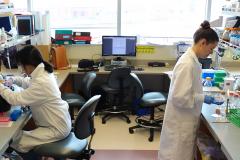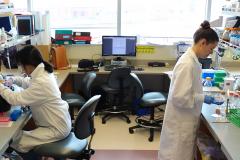Scientists have developed a molecular “clock” that could reshape how pediatricians measure and monitor childhood growth and potentially allow for an earlier diagnosis of life-altering development disorders. The research, published this week in PNAS, describes how the addition of chemical tags to DNA over time can potentially be used to screen for developmental differences and health problems in children.
BCCHR Website News
Science hits the runway at Vancouver Kids Fashion Week
BC Children's Hospital and Vancouver Community College presented their spring/summer 2020 fashion collection at the Vancouver Kids Fashion Week in October. The collection featured elements inspired by science's favourite model organisms.
New grants boost research into nutrition and the epigenome
Child abuse could leave ‘molecular scars’ on its victims
A step forward in a worldwide effort to create a diagnostic test for FASD
In a study published in Clinical Epigenetics, Dr. Michael Kobor and his colleagues identified a series of distinctive changes in DNA methylation – a chemical modification to the DNA that can affect how genes are regulated - that seems to be associated with fetal alcohol syndrome disorder. Pinpointing these unique patterns brings researchers closer to creating a simple test that could help to diagnose FASD faster and earlier in life.
Exploring the lifelong impacts of our earliest experiences: Q&A with Dr. Sarah Moore
A recent study in Development and Psychopathology co-led by Dr. Sarah Moore and Dr. Michael Kobor shows that the amount of physical contact babies receive early in life correlates with changes in marks upon the genome that might affect whether or not genes are expressed, potentially impacting health and development.





